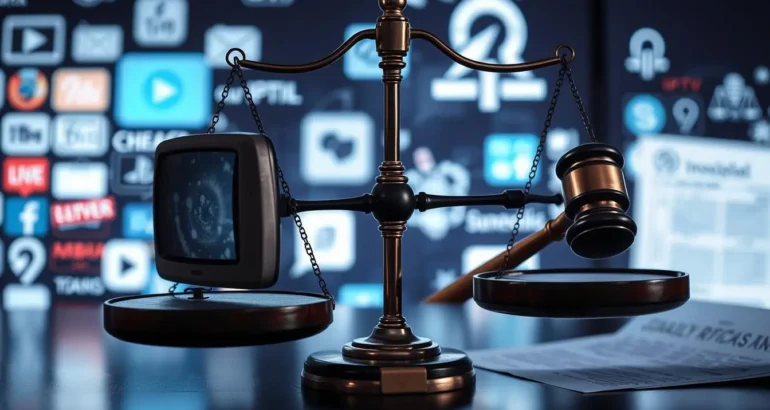Introduction
In today’s streaming-driven world, IPTV, or Internet Protocol Television, has become a popular choice for watching TV. But with IPTV’s benefits come important questions about legality. With numerous services providing live TV, movies, and sports at a fraction of traditional cable costs, you may find yourself asking, Is IPTV legal? This article will guide you through the distinctions between legitimate and questionable IPTV services in the United States, helping you make informed choices to enjoy streaming safely and legally in 2025.
What Makes an IPTV Service Legal in the United States?
IPTV operates through internet protocols rather than traditional satellite or cable. While this shift opens up numerous possibilities for streaming, it also raises legal complexities. In the U.S., the legality of an IPTV service boils down to one core factor: licensing. For an IPTV service to be legal, it must hold the proper licenses to broadcast copyrighted content.
Understanding IPTV and Legality
Legal IPTV services pay content providers for distribution rights. Just as cable companies obtain rights for each channel they broadcast, IPTV providers must follow similar procedures. If a service can’t produce evidence of licenses, it’s likely not legally streaming content.
Regulations Governing IPTV Services
The U.S. government and organizations like the FCC (Federal Communications Commission) regulate these services to ensure that content creators are compensated. When an IPTV provider bypasses these rules, it falls into an illegal operation category.
How to Identify Legal IPTV Providers
Not every IPTV provider follows the rules. Here’s how to spot the difference between a reputable service and a questionable one.
Signs of a Legitimate IPTV Provider
Legal IPTV providers often invest in a strong digital presence, which includes having a well-designed website, comprehensive customer support, and transparent content licensing. Look for:
- Official partnerships with major networks or content producers.
- Transparent pricing and payment options; illegal services often lure customers with suspiciously low prices.
- Customer support that’s readily available.
Red Flags of Illegal IPTV Services
Certain indicators point directly to an IPTV service operating illegally. For instance:
- Unrealistically low pricing—services that charge a fraction of standard cable fees without clear licensing are likely illegal.
- No mention of licenses—if you can’t find any information about licensing or partnerships, that’s a red flag.
- Frequent outages—illegal IPTV services are often unreliable, with channels going down unexpectedly as providers evade detection.
Key Licenses Required for IPTV Services
IPTV providers who adhere to the law must obtain specific licenses to distribute content legally.
Types of Licenses IPTV Providers Need
IPTV services must acquire distribution and broadcast rights directly from content creators or legal rights holders. This includes:
- Transmission rights for distributing content across regions.
- Public performance rights for showing live broadcasts or performances.
How to Verify Licensing Information
A legitimate IPTV provider is usually transparent about licensing, often displaying it on their website. Many services include a licensing page, which may link to networks or content libraries they’re authorized to stream. When in doubt, you can cross-reference the provider’s name with networks to confirm their legality.
What Are the Risks of Using Illegal IPTV Services?

Choosing an illegal IPTV service isn’t just risky for the provider—it could also lead to consequences for the user.
Potential Legal Actions Against Users
Streaming content without the proper licenses is a breach of copyright law. While IPTV providers face the brunt of legal actions, users can be implicated, too, depending on the extent of their involvement. The U.S. Copyright Act can potentially hold users accountable if they knowingly engage in pirated streaming services.
Consequences of Streaming from Illegal Sources
Besides legal repercussions, illegal streaming services bring various risks:
- Data privacy risks: Illegal providers may not prioritize secure streaming or data privacy, making you vulnerable to malware.
- Unstable service quality: Illegal IPTV platforms lack guaranteed uptime, so content may vanish or buffer endlessly.
Understanding Fines and Penalties
In the U.S., streaming from illegal sources can lead to fines, usually tied to the damages incurred by copyright holders. Repeat offenders face stiffer penalties, with potential lawsuits totaling thousands of dollars.
What Are the Best Legal IPTV Services Available in 2025?

Sticking with reputable IPTV services provides peace of mind, high-quality streaming, and consistent access to live and on-demand content.
Top Legal IPTV Providers in the USA
These providers ensure full compliance with U.S. regulations:
- Iptvstart10: A popular choice with on-demand streaming and live channel access.
- HD-iptv: Known for its large selection of live channels and user-friendly interface.
- apollogroupe-tv: Best for sports fans, with a variety of live sports channels and events.
Features to Look for in Legal IPTV Services
Legal IPTV services typically offer:
- HD streaming and multi-device compatibility
- Responsive customer support and transparent terms
- Official applications in app stores, a marker of legitimacy
Comparing Subscription Costs for Legal IPTV
Although legal IPTV subscriptions may cost more than illegal options, they provide reliable access, HD quality, and security. Comparing prices helps find a service within your budget without compromising legality.
Can a VPN Help You Use IPTV Services Legally?

A common question for IPTV users is whether a VPN, or Virtual Private Network, can “legalize” access to content otherwise unavailable.
Is Using a VPN for IPTV Services Recommended?
A VPN can add an extra layer of privacy to your streaming, concealing your IP address and encrypting your data. However, a VPN doesn’t change the legal status of a service.
How a VPN Can Protect Your Privacy While Streaming
VPNs mask your online activity from ISPs and external entities, offering anonymity. They don’t circumvent licensing laws, but they are helpful if privacy is a concern.
Choosing the Right VPN for IPTV Use
If you choose to use a VPN, look for one with:
- High-speed servers optimized for streaming
- Strict no-log policies
- Broad device compatibility
What Should You Do If You Suspect Your IPTV Subscription is Illegal?
If you’re concerned that your current IPTV provider isn’t operating legally, here’s how you can address it.
Steps to Take for Evaluating Your IPTV Service
To assess your provider’s legitimacy, start by checking for:
- Licensing information on their site
- Customer support availability and overall transparency
- User reviews detailing service reliability and support
Reporting Illegal IPTV Providers
Reporting illegal services helps protect others and supports legal content distribution. The FCC or local copyright protection bodies can take reports about services suspected of operating illegally.
8. Exploring the Future of IPTV in 2025
With streaming trends continually evolving, 2025 promises new changes in IPTV.
What Changes to Expect in IPTV Regulations
Increased scrutiny on content licensing and potential regulatory shifts could mean stricter enforcement against illegal IPTV services. Emerging technologies will enable regulators to track illegal activities more effectively.
Emerging Trends in Legal IPTV Offerings
Legal services will likely expand their content libraries and enhance accessibility, making them more competitive with illegal options. Expect more streaming options tailored to niche preferences, interactive viewing, and enhanced quality.
How to Transition to Legal IPTV Options
Making the shift from illegal to legal IPTV can be simple and rewarding.
Guidelines for Switching to a Legal IPTV Service
Start by identifying reputable services that match your viewing needs. When canceling any previous service, ensure you delete related data or applications to avoid unintentional usage.
Benefits of Legal IPTV Subscriptions
Choosing a legal provider ensures:
- Stable, high-quality streaming
- Access to customer support for technical issues
- Peace of mind without the risk of fines or malware
FAQs About IPTV Legality in the United States
Is IPTV Legal?
Legal IPTV subscriptions come with clear licensing details and reliable support.
What to Do If I Am Using an Illegal IPTV Service?
Discontinue the service, delete apps or accounts associated with it, and look for a verified alternative.
How Can I Report Illegal IPTV Services?
Reporting services to the FCC or copyright boards helps protect other consumers.
Can I Stream Live TV Legally with My IPTV Subscription?
Yes, as long as your provider has distribution rights for the channels offered.
How Do Internet Service Providers View IPTV Services?
ISPs support legal IPTV services but may impose restrictions on illegal streaming activities.
Conclusion
As IPTV laws change, it’s key for users to know their rights and make smart choices. IPTV’s legality is complex, with many laws and rules to follow. This includes copyright laws, broadcasting rules, and licensing needs.
We’ve looked into IPTV’s tech, the differences between legal and illegal providers, and the legal risks of unauthorized services. The main point is that IPTV can be a great way to watch lots of content. But, it’s vital to pick a legal service.
Knowing about iptv legality, legal streaming, and iptv regulations helps you make good choices. This way, you can enjoy your favorite shows without worrying about legal trouble. Keeping up with IPTV’s changes helps you stay safe and legal while streaming.


